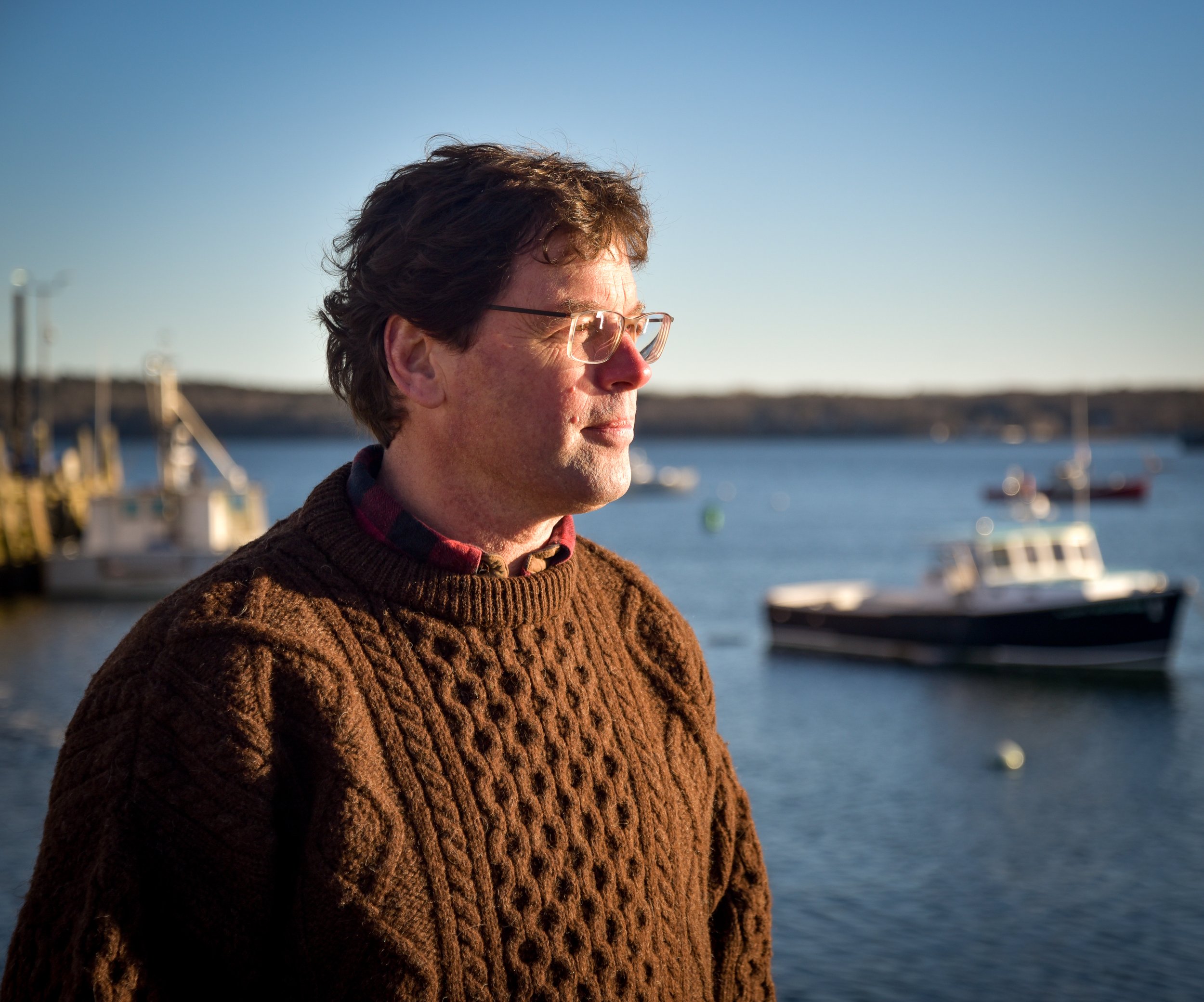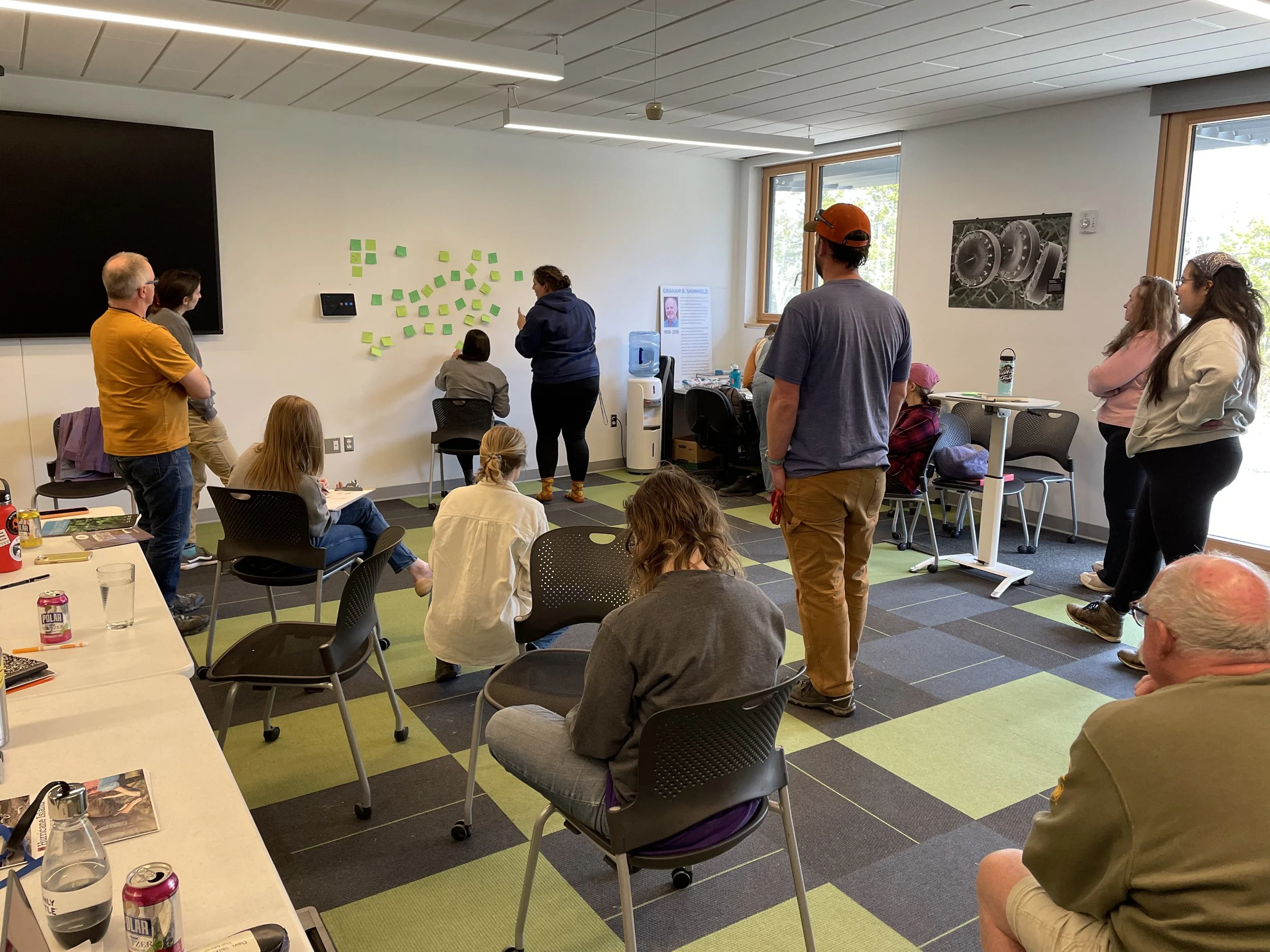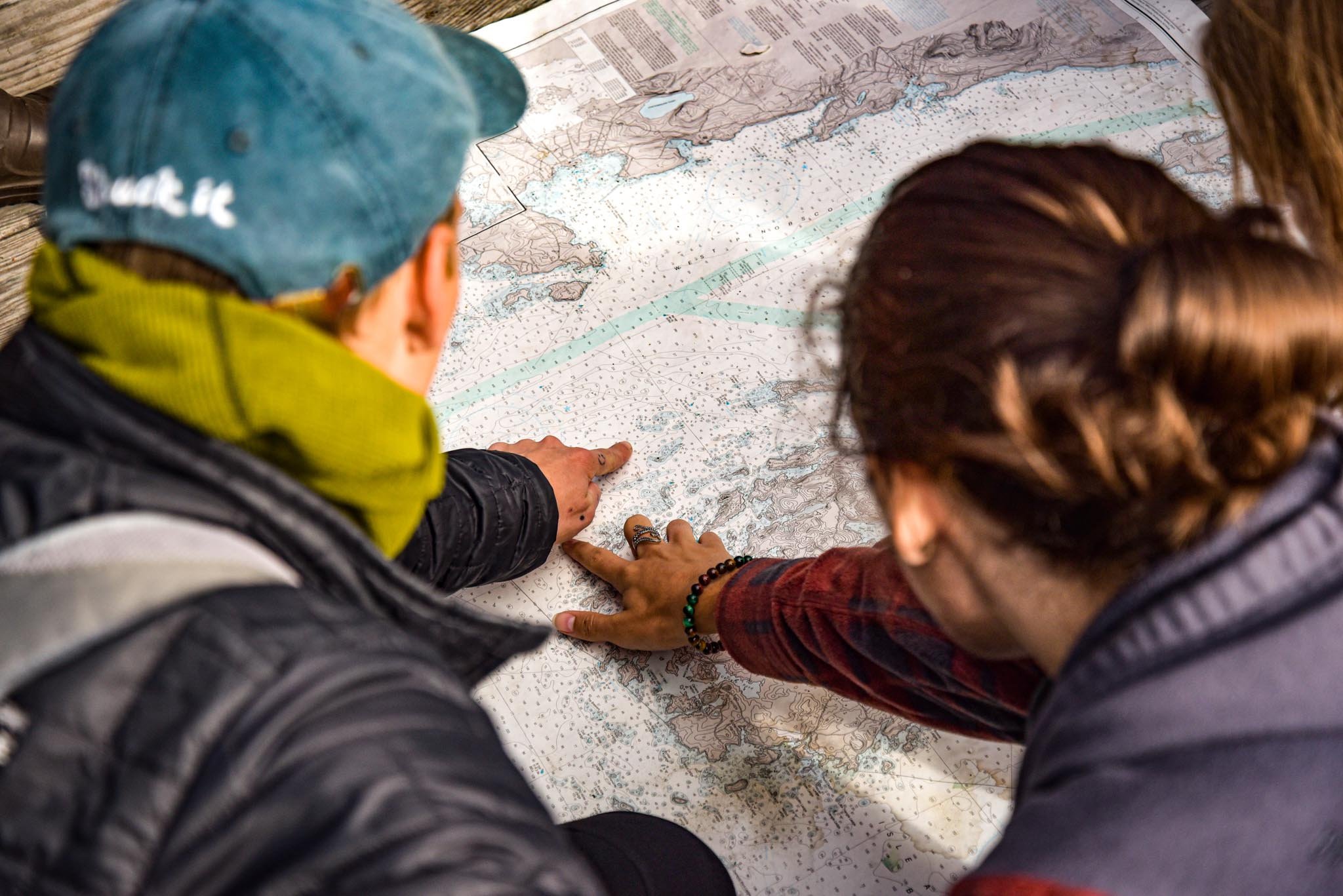Will Galloway Joins Hurricane Island Center for Science and Leadership as Education Director, Leads North Haven & Vinalhaven Teacher Professional Development Program Funded by Maine Dept of Education
East Boothbay, Maine - On an uncharacteristically beautiful mid-April Monday, applause erupted from a conference room inside the Graham Shimmield Residence Hall at Bigelow Laboratory for Ocean Sciences. Inside, 13 educators from Vinalhaven and North Haven had just come to the conclusion of Phase I of a three-day Climate Education Professional Development Grant funded by the Maine Department of Education and delivered by Hurricane Island Center for Science and Leadership.
“This has been really helpful to work with Hurricane. There’s been time to connect with fellow educators and time for things that don’t really happen in our day to day - especially in a small school where you have so many different roles to take on.” said Amanda Labelle, North Haven Community School’s Arts & Enrichment Coordinator.
Temptations of April break aside, the educators came together from their respective islands to collaborate on integrating hands-on, climate-focused, project-based learning into their classrooms. This opportunity not only strengthened the professional skills of island teachers, it allowed them to coalesce and build relationships to one another internally across departments as well as across islands.
Bryan Feezor, Assistant Principal at the Vinalhaven School shared “There’s not a lot of people who face similar realities and know what it’s like to go from a 6 year old to High School to Middle School in just a morning.”
The program is called Teaching Resilience: Professional Development for Climate Curricula, and brings in a diverse range of teaching talents including science, statistics, the arts, and included humanities teachers such as North Haven Community School’s Fred Emerick - “We’ve got a project idea that’s in place and ready to begin and I have a model for continuing that beyond this project and a network who I knew but didn't have a relationship with before.”
Newly at the helm of the Education Team for Hurricane Island is Will Galloway - With over 30 years of experience as an educator, mediator, consultant, and most recently as the Head of School for Watershed in Camden, Maine. Galloway’s talent is bringing people together, and that talent has already been put to great use, and will continue as Hurricane Island anticipates the busiest year of programs yet. Whether it is bringing together families, schools, nonprofits, for-profits, students or community organizations, Will hopes to create opportunities for convergence.
Will has a knack for understanding the nuances of leadership as well, “Leadership is the capacity to demonstrate fluid expertise. Which means knowing when to lead and knowing when to join. It’s not one or the other but knowing how to be a part of, and support a group and also knowing when a group looks to you for direction.” and as Hurricane Island continues to evolve and think about how to make change in the world, leadership matters, “It’s not a leadership that imposes but a leadership of supporting.” shared Galloway
He has a track record of success in implementing community-wide sustainability initiatives in midcoast Maine and that track record stretches back to his time in the Peace Corps in Thailand. These successes only come from a sense of coming together in consensus and harmony
“I see Hurricane Island as a really good opportunity to build on the convergence that happens on the island, both with the staff and the students. My hope is to see the sense of community we create here be fully realized when participants return home. I want to use this experience to help plant the seed of what is possible when engaging with one another and their environment”.
Galloway plans to bring a more explicit awareness to the community-building, leadership development aspect of Hurricane Island - something that many feel is necessary against the current backdrop of American and world politics. Concepts like social emotional learning and resiliency draw on moral growth, sense of self, and relationships, and these ideas are increasingly being quantified and prioritized in formal and experiential education alike.
“Through our work at Hurricane Island, our participants gain confidence and grow more vulnerable, they have the courage to engage with one another on a deeper level, and leave seeing one another differently.”
This approach to consider the relationships between individuals and groups, different perspectives, and how to support one another is key to reaching the consensus necessary to approach the politicized large-scale issues posed by climate change in coastal communities like Vinalhaven and North Haven.
In Phase I of this program teachers workshopped with leaders in place-based education and found guidance around curricular design in climate specific content areas, with the ultimate goal of designing a learning project to be implemented in the remainder of the school year. These projects were timely, responsive and relevant to the major changes happening in Penobscot Bay and the Gulf of Maine at large
With an eye towards the fisheries, Vinalhaven science teacher Ruth Brooker, is looking at the lobster industry. In Vinalhaven, lobstering is an extremely visible and important part of the local economy and lobster boats dominate the harbor. “We’re focusing on lobster and sea temperature data” shared Brooker. A Georgia transplant in her first year at Vinalhaven School, she is becoming fully immersed in the ecology around her - just a week earlier she had students participating in marine field research with Hurricane Island, part of a NOAA-funded collaborative study on Maine scallops which includes Colby, Bates and Maine Center for Coastal Studies.
Break out sessions led by the Hurricane Island staff included year-round Hurricane Island Educator Claire Gabel, who is returning from the 2023 season. She took teachers on an ecology walk and with prompts of ‘what do you notice, what makes you wonder, and what does this remind you of?’; and Assistant Education Director Kyle Amergian led a foray into the intertidal zone and introduced the five E’s of teaching - Engage, Explain, Explore, Elaborate, and Evaluate.
North Haven Community School Project Coordinator Maddie Hallowell is also considering environmental impacts on her island - with a background in environmental monitoring and her experience with surveyors and drone use. Her idea is to collect “ consistent and regular measurements on coastal erosion around North Haven with students” with a component of outreach to seasonal and year round residents. “I have access to students of all ages, and I think students are interested in this especially after the storms this winter.” said Hallowell.
It is important to consider the necessity for scientific literacy as well. Teacher presentations transitioned into goals and desired outcomes, this was evident as a Vinalhaven math teacher David McKechnie offered the collaborative services of his statistics class; “Many projects are going to be using data and my goal is to help the various projects in both islands use their numbers in the most efficient, careful, realistic and scientific ways possible. My superpower is my students … No exaggerations or assumptions allowed!”
Thinking about the projects goes hand in hand with considering the results; for Ruth Brooker on Vinalhaven “One of my successes would be students that are able to communicate understand past historical trends in temperatures in the Gulf of Maine and lobster populations and identifying a correlation for future comparison - we could start a community conversation about trends and have interviews with what folks see now”.
Likewise for Maddie Hallowell and her coastal erosion project, “My success would be creating a data collection protocol sheet and making nice graphic pieces that community members could see, creating consistent data and perhaps a suggestion sheet for landowners on how to mitigate erosion. This could include planting native plants, landscape changes, or even things not to do.”.
The teachers will be supported by Hurricane Island Center for Science and Leadership, which has year round professional researchers and educators with time set aside for this collaboration. Local community organizations will play a role as well, partnerships have been identified with Vinalhaven Land Trust, North Haven Conservation Partners, The Climate Working Group and the Town of North Haven.
These projects are now entering Phase II, wherein the research projects will be organized and carried out and in Phase III these teachers will come together again on Hurricane Island in late summer to share their experiences implementing their community-based projects.
Assistant Education Director Kyle Amergian was ready to lean in with everything that Hurricane Island has to offer, “We’re excited for the next step in all of this and hope that you’ll utilize me. I’m ready to come help and put these plans into action.”. This offer of support includes access to Hurricane Island’s scientific and educational resources, which includes a fleet of vessels with scientific gear to deploy and take oceanographic measurements and samples. It also includes staff such as Amergian, who is the Assistant Director of the organization’s Education Department, as well as the Hurricane Island’s Science & Research team, led by Dr. Anya Hopple.
Sitting just a few miles away from both Vinalhaven and North Haven, the staff and educators of Hurricane Island are equally familiar with the opportunities and challenges presented by the island landscape and local ecology. Hurricane Island’s Research and Education staff are no strangers to the classrooms and coastlines of either island and as such they are an ideal connector for this professional development opportunity.
North Haven science teacher Sam Taggart summed up the overarching theme of the effort, “You’re trying to get people to think about and care about what is going on around them”. This motivation combined with a long overdue sense of creating inter-island relationships could be felt even by the end of the 3 days at Bigelow. Amanda Labelle, Arts & Enrichment Coordinator for North Haven shared that “finding our throughlines in these trainings will help us in the future because we will have established a process of collaborative practices with our disciplines and be able to feel like that’s something we can continue to do. We can use this as an opportunity to generate that continued collaboration in this hands-on interdisciplinary approach.”.
For more information about the Maine Department of Education Climate Education Professional Development Grants contact Teddy Lyman, Climate Education Specialist at the Maine DOE Office of Innovation at theodore.lyman@maine.gov













